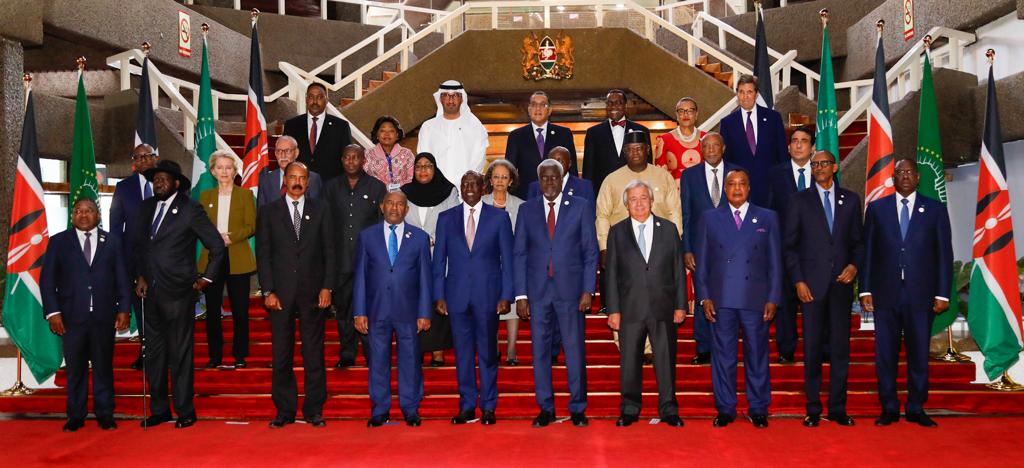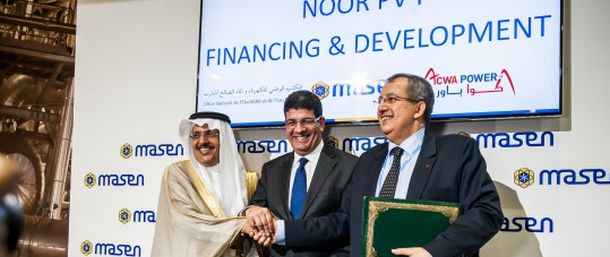
La república del Sáhara Occidental expresa su deseo de ser incluida en la gobernanza climática liderada por la ONU.
Imagen: el presidente del Sáhara Occidental, Brahim Ghali, en la fila intermedia, junto a la presidenta de la Comisión Europea, Ursula von der Leyen.
"El fracaso del proceso de descolonización ordenado por la ONU en la última colonia de África, el Sáhara Occidental, no puede ser una excusa para excluir a la República Árabe Saharaui Democrática (RASD) de desempeñar su papel en la lucha mundial contra el cambio climático y sus impactos devastadores", afirmó hoy el presidente del Sáhara Occidental, Brahim Ghali, en su discurso en la Cumbre Africana sobre el Clima en Nairobi.
La Cumbre tendrá lugar del 4 al 6 de septiembre. La delegación de la república del Sáhara Occidental está encabezada por su presidente, quien tomó la palabra hoy para resaltar la injusticia climática que se está produciendo en el Sáhara Occidental ocupado.
"No es aceptable que todavía estemos excluidos de los sistemas financieros que se han establecido para actuar sobre el cambio climático, así como también es injusto no acceder al apoyo técnico a través de los mecanismos de financiación climática de la ONU o de iniciativas de desarrollo multilaterales", dijo el Sr. Ghali.
La República del Sáhara Occidental (RASD) es un estado miembro de la Unión Africana, pero no de las Naciones Unidas y, como tal, no es parte de la Convención Marco de las Naciones Unidas sobre el Cambio Climático (CMNUCC).

El fracaso de la ONU para resolver el conflicto en el Sáhara Occidental ha resultado en la exclusión del gobierno del Sáhara Occidental de los mecanismos financieros y de gobernanza climática mundial. Mientras tanto, el pueblo saharaui (en gran parte viviendo como refugiados en una de las zonas más inhóspitas del desierto argelino como consecuencia de la brutal ocupación de Marruecos) está cada vez más expuesto y es cada vez más vulnerable al empeoramiento de los peligros climáticos a los que apenas han contribuido. Además de eso, la ONU acepta que Marruecos, que ocupa el Sáhara Occidental, incluya el territorio en sus planes climáticos nacionales redactados en virtud del Acuerdo de París, lo que le permite al país inflar artificialmente sus esfuerzos de mitigación climática y, como resultado, beneficiarse al máximo del mecanismo de financiación para el cambio climático.
“Es absolutamente necesario que la RASD esté representada en la CMNUCC y en las COP y sea firmante del Acuerdo de París para participar en las negociaciones climáticas y presentar formalmente nuestra Contribución Determinada a Nivel Nacional (NDC) a la Secretaría de la CMNUCC”, añadió Ghali, refiriéndose al plan climático, o NDC, que el Gobierno saharaui ha desarrollado por iniciativa propia para delinear las acciones que pretende emprender para contribuir a los esfuerzos globales para abordar la crisis climática.
La delegación marroquí en la Cumbre iba a estar inicialmente encabezada por el Primer Ministro Aziz Akhannouch, pero en protesta por la participación saharaui, esa delegación se ha reducido significativamente.
La Cumbre de tres días reúne a jefes de Estado e inversores de África y de otros lugares para compartir experiencias y soluciones para una África sostenible y resiliente. Planean emitir una declaración que describa la posición de África antes de una conferencia climática de la ONU a finales de este mes y la COP28.

A continuación se muestra en inglés el discurso completo del presidente de la RASD, pronunciado el 5 de septiembre de 2023.
“Your Excellency Mr. William Ruto
President of the Republic of Kenya and President of the AU Committee of Heads of State and Government on Climate Change
Your Excellency Mr. Azali Assoumani
chair of the African Union
Your Excellency Mr. Moussa Faki
Chairman of the AU Commission
Excellencies
Ladies and Gentlemen
Distinguished Guests,
first of all, I would like to express my sincere thanks and appreciation to the Government and the People of the Republic of Kenya, headed by His Excellency Mr. William Ruto, for the kind invitation, for the warm reception we received.
We very much appreciate the conditions you provided to make this event a successful one: the African Climate Summit.
Like other nations represented here today, the SADR is on the frontline of the climate crisis.
We are facing the challenges of climate change at the same time as we are engaged in the struggle for decolonization and against the occupation posed by the Moroccan state, and these challenges are linked.
This situation has driven over 200,000 Sahrawis into the desert interior, where temperatures are higher, and where the projected impacts of climate change are more extreme than in the occupied homeland from which they have been displaced.
In the Occupied Territories of the SADR, illegal systematic discrimination and exclusion make our people more vulnerable to the impacts of climate change. The development by the occupier of settlements, industry, commercial fisheries, coastal infrastructure, and export agriculture, place our environment and natural resources under greater stress.
The occupation military Berm that divides our country starves the eastern areas of water, driving ecological degradation and amplifying the effects of drought in the Liberated Territories of the SADR. The mine-contaminated areas along the Berm turned to be uninhabitable and with low economic productivity.
These challenges made it both more difficult and more urgent for the SADR to take action on climate change. In recent years we have increased our focus on climate change. The SADR has developed its own Nationally Determined Contribution or NDC, setting out our situation and position, and identifying actions to adapt to climate change and to mitigate it through development based on renewable energy rather than fossil fuels. The NDC is supported by a National Adaptation plan or NAP. The NDC and NAP have been cross-ministerial initiatives.
In the Sahrawi refugee camps, the Sahrawi Government has developed water-efficient agricultural systems and new, low-cost methods of housing construction to confront increased flood risk. Small-scale solar power systems are widespread in the camps.
In the Liberated Territories of Western Sahara, We have piloted rural electrification projects based on solar and wind power, including solar water pumps to support livestock and horticulture, and photovoltaic systems to support medical facilities in remote locations.
Mr. President,
Although the SADR is a desert Country, we have much to offer Africa's Blue Economy. Our Atlantic coasts that long over 1110 km are home to abundant fisheries, and our coastline houses important wetlands, including four sites recognised under the international Ramsar convention: Oued Seguia, Boujador, Bay of Dajla and Sabjet Imlili.
Though all these resources are vulnerable to climate change and over exploitation by the occupying State, the SADR will take a different, more responsible, and sustainable approach to the management of our assets in accordance with the African initiative and its aims in preserving the coasts and wetlands in our Continent and worldwide.
We will ensure that sites of international ecological and scientific importance have proper climate-sensitive management plans. We will seek partnerships with other African countries and organisations to build our capacity and share knowledge relevant to the Blue Economy.
The failure of the UN mandated decolonization process in the last Colony of Africa, Western Sahara, cannot be an excuse to exclude the SADR from playing its part in the world’s struggle against climate change and devastating impacts. It’s not acceptable that we are still excluded from financial systems that have been established to act on climate change, as well as unfair not to access Technical Support through UN climate finance mechanisms or multilateral development initiatives.
Nothing can obstruct the SADR from its right and duty to contribute in Africa's, and the world’s existential battle against climate change.
No one can prevent us from sharing the skills and knowledge gained through decades of adapting to harsh climatic conditions with other peoples and nations.
It's absolutely necessary that the SADR be represented in the United Nations Framework Convention on Climate Change (the UNFCCC) and at the COPs and be a signatory to the Paris Agreement to participate in climate negotiations, and formally submit our NDC to the UNFCCC Secretariat.
A Sahrawi voice in the UNFCCC and at the COPs will be another African voice at the table and can only strengthen Africa’s position.
The sustainable development and management of Africa’s Blue Economy is closely linked to how we respond to the challenge of climate change. The SADR stands ready and willing to play its part in both with its sister African nationals and world nations.
Thank you very much and I wish you all the best"
Energía verde sucia en tierras ocupadas
¿Cómo puede estar mal desarrollar energía renovable en un mundo que necesita desesperadamente una transición verde? En el Sáhara Occidental los problemas son numerosos.
Los saharauis protestan contra el ecoblanqueo de Marruecos
La sociedad civil saharaui expresa su preocupación por los gigaplanes de energía renovable de Marruecos en el Sáhara Occidental ocupado durante la cumbre climática COP28 y ante el relator especial de la ONU.
No habrá justicia climática para el Sáhara Occidental en la COP28
Mientras líderes, empresas y la sociedad civil de todo el mundo se reúnen para las conversaciones sobre el clima en Dubai, un pueblo permanece básicamente sin representación.
COP22, escenario de negocio sobre plantas solares en el Sahara ocupado
Marruecos ha elegido a la compañía saudí ACWA Power para desarrollar 100 MW de energía solar en el Sahara Occidental ocupado. El trato fue sellado en la Conferencia sobre el Clima de las Naciones Unidas, COP22.



